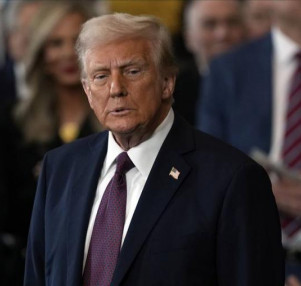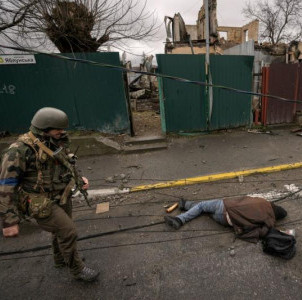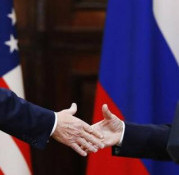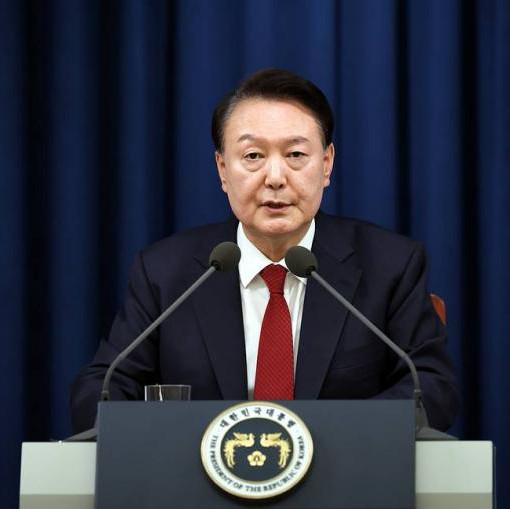The Persian Gulf increasingly resembles a boiling pot. Whereas Washington keeps plying the fire with fresh fuel.
You be the judge: the United States has opted for another attempt to push for peace in the region. Last week US Secretary of State Mike Pompeo declared that Washington and its allies were setting up a coalition to ensure freedom of navigation in the Persian Gulf and the Strait of Hormuz. The coalition will surely be led by the US. The White House has hardly taught anything from the bottom line of previous coalitions in Afghanistan and Iraq.
The US wants “change in behavior from the Iranian leadership,” while the coalition is part of “deterrent actions,” Pompeo said pointedly when announcing its formation. However, Donald Trump’s administration appears to try again to fight a fire with kerosene.
For Iran, the patrolling of the Strait of Hormuz by ‘aliens’ is poised to result in a complete blocking of its crude exports, against which the US has slapped severe sanctions. Tehran’s response to Washington’s ‘peaceful initiative’ was acute. The very next day, on July 24, Iranian President Hassan Rouhani emphasized at a weekly cabinet session that security in the Persian Gulf, Sea of Oman and Strait of Hormuz is paramount to Iran. For this reason, “it is Iran and the other littoral states, which are chiefly responsible for securing the Persian Gulf and the Strait of Hormuz, and the issue has nothing to do with others.” He also stressed that Iran would “decisively confront any attempt at destabilizing the strategic waters,” the executive head of the Islamic Republic of Iran was quoted as saying by the Press TV channel.
An even more hostile response was seen from Iranian Brigadier General Hossein Dehghan, former Defense Minister and currently chief advisor on defense affairs to the spiritual Supreme Leader of Iran, Ayatollah Ali Khamenei. He warned in an interview with the Qatar-based Al Jazeera TV: “Any change in the status of the Strait of Hormuz will open the door to a dangerous confrontation." “If Washington decides to go to war all American bases in the region will be targeted,” he threatened, noting simultaneously that any war against Iran would be regarded not only as a war against it, but against all its allies in the Middle East. That sounds like a real threat for Washington. Let us say in Iraq, where the number of American servicemen roughly stands at 7,000, there are quite a few Shiite military-political units loyal to Tehran, which in case of a conflict in the gulf will step in.
Meanwhile, Tehran leaves doors open for peaceful talks with neighbors. Dehghan revealed Iran’s readiness to form a coalition with neighboring states for ensuring peace in the region. By the way, Iran has been urging all states of the Persian Gulf, a strategically important and concurrently troubled region, to enter into a collective nonaggression agreement for years, thus taking the first step towards creating a system of collective security of littoral countries.
However, all indications are that the United States takes absolutely no interest in a peaceful Persian Gulf. Fair enough, de-escalation of tension will gradually reduce the demand of littoral states for arms buildup. Which is a direct loss threat for US defense concerns. And (oh, the horror!) the question whether it is reasonable to keep American military bases in Saudi Arabia, the UAE, Bahrein, the US Navy's Fifth Fleet in the waters of the Persian Gulf and Strait of Hormuz and, consequently, a pretty hefty military contingent in the region in general, may come up. What about the ever present American interests thousands of kilometers away from the US' coast? They may be undermined!
Then the peaceful process should be confronted. By whatever means necessary. So a show is being arranged: first involving tanker blasts in the Persian Gulf, then provocations violating the Iranian air space, when Iran’s Islamic Revolutionary Guard Corps (IRGC) Quds force shot down an American drone aircraft.
Britain joined the mockery as well. On July 4, its marine detained the Grace 1 supertanker in Gibraltar on suspicion that it allegedly delivered Iran’s crude oil to Syria in violation of the European Union’s sanctions, which (tough luck!) are obligatory only for the EU states. London was so quick to cave in to Washington that it simply did not bother with drawing up legal arguments for the vessel’s arrest. Anyway, it has already become a good British tradition to ignore the international law when it benefits the UK. The provocation worked – in response, Iran also arrested two British tankers – Stena Impero and Mesdar. Notably, Iranian media reports said that the arrest of Stena Impero by the IRGC’s patrol boats was no accident. The tanker collided with an Iranian fishing boat in the Strait of Hormuz and ignored its multiple distress signals. The injured fishermen are now in hospital in a grave condition.
Washington has turned the trick and led the world community up to the keynote of the performance. A coalition is required. (Why engage such international institutions as the UN, League of Arab States or European Union?) The patrolling operation has even been named already – Sentinel, Strazh in Russian. Not the policeman of the world under the Stars and Stripes, but a noble Galahad, no less!
It is worthy of note that the Persian Gulf drama comes against the background of US President Donald Trump’s standoff with Congress over $8.1 bln contracts on arms supplies to a number of Persian Gulf’s monarchies. Trump is trying to convince lawmakers that arms exports are crucial for providing a protection of the region against what he calls “the malign influence” of Iran. However, Congress has once again passed three bills banning arms deliveries to Saudi Arabia and the UAE, due to the fact, that they have been committing war crimes in Yemen for more than four years, killing civilians and eliminating the country. The occupant of the White House has vetoed the bills. By all accounts, a further escalation in the Persian Gulf is round the corner. After all, Trump needs to convince Congress that those supplies are necessary!
Now, Britain is also giving green light to sales of arms worth $800 mln to Saudi Arabia contrary to the ruling of its own court of appeal adopted in June. Is that the contract hiding an in-depth interest of London to participate in anti-Iran provocations?
The coalition idea and the Strazh operation have become a safe line for Washington’s administration after the virtual fail of the 'anti-Iran stick' project dubbed the 'Middle Eastern NATO’. Several influential countries of the region have already refused to participate in such a bloc. It appears the United Arab Emirates is also shifting to the ‘hesitating’ camp. Hossein Dehghan has said that a few delegations from UAE have visited Iran recently in a peaceful attempt.
Today it is apparent that those who will join the US will virtually enter the ‘war coalition’ in the Persian Gulf.









